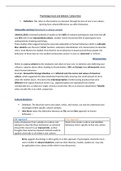Psychology issues and debates: Cultural bias
Definition: This refers to the tendency to interpret through the lens of one's own culture,
ignoring how cultural differences can affect behaviour.
Universality and bias (Revisited in a cultural context)
(Henrich,2010) reviewed hundreds of studies to find 68% of research participants came from the US,
and 96% were from industrialised nations, another review found that 80% of participants were
undergraduate studying psychology.
These studies often suggest having the universal explanation of human behaviour which is culturally
bias. Henrich uses the term WIERD (western, educated, industrialised, rich, democracies) to describe
who is most likely to be studied. Now that the norm behaviour is based around these people, the
behaviour of those that are not studied (uneducated, poorer) is seen as 'abnormal' or 'inferior'.
Ethnocentrism
Refers to judging cultures by the standards and values of your own, in extreme cases believing your
culture is superior above others leading to discrimination. USA and Europe have ethnocentric views
about human behaviour.
Example. Ainsworths Strange Situation as it reflected only the norms and values of American
culture, which suggested the ideal attachment had the baby showing only small amount of stress
when the mother leaves. This led to the misinterpretation of child rearing practises that were
different from typical American norms. E.g., Japanese babies are separated from mother
considerably less, so distress is larger, America would view this as an insecure attachment (Tekashi)
when actually this is an unfair comparison.
Cultural Relativism
Definition: The idea that norms and values, ethics, and morals, can only be understood and
meaningful within specific cultural contexts.
John Berry states the distinction between an Etic and an Emic approach to human
behaviour....
Etic Approach Emic Approach
Looks at behaviour from outside of a culture and Works from inside a culture and identifies
attempts to describe these behaviours as universal behaviour that is specific to that one culture.
Ainsworths research is an imposed etic, as they
thoughts their American devised methods could be
applied universally to all children and cultures.
Berry suggests Psychology is often guilty of an Etic approach, Psychologists should be much
more mindful of cultural relativism, and how their theories, models, studies etc. may only
be applicable to the culture within which it was discovered.





